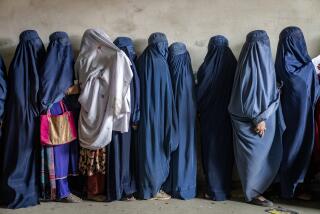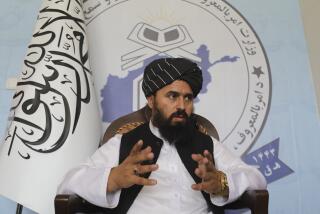Female Afghan Official Appeals for Distaff Staff at U.S. Embassy
WASHINGTON — The head of Afghanistan’s newly created Ministry of Women’s Affairs challenged Secretary of State Colin L. Powell on Monday to pick women for high-profile jobs at the U.S. Embassy in the war-ravaged country.
After the deposed Taliban’s harsh reign rendered women largely invisible, the minister, Sima Samar, said the international community has an obligation to put women in high-profile positions to demonstrate that a new day is coming.
Samar, a 44-year-old physician, talked to reporters during her first visit to the United States as women’s affairs minister and one of five deputy prime ministers. The interim government is scheduled to be sworn in Saturday for a six-month transition to a new civilian government.
Samar, who graduated from Kabul University’s medical college in 1982 when Afghanistan was under Soviet occupation, insisted that oppression of women was never part of Afghan culture until the Taliban took power. But the country also never had a ministry devoted entirely to the welfare of women.
Other ministries in interim Prime Minister Hamid Karzai’s government will have to operate out of buildings heavily damaged during two decades of warfare, she said. But the women’s ministry does not have even similar quarters.
Samar said Powell gave her a “positive” response to her request for women in the international peacekeeping force. That was an easy position for the secretary of State to take because international peacekeepers always include women these days.
Samar also called for a woman to be named U.S. ambassador to Afghanistan, but the Bush administration is said to have already offered the job to a man, Afghanborn Zalmay Khalilzad, a member of the president’s National Security Council staff.
She said Powell had assured her that there will be women in top jobs at the embassy.
“That’s fair enough,” Samar said.
A member of the minority Hazara ethnic group, Samar fled Afghanistan in 1984, settling in Quetta, Pakistan, where she operates a clinic that caters to Afghan refugees. An organization she founded in 1989 also maintains 11 clinics and four hospitals in Afghanistan, all dedicated to providing female health care.
She said she will make health and education priorities in the interim government. Under the Taliban, women were not allowed to work outside the home, and girls were forced to leave school at age 8.
Although schools for girls are needed immediately to reverse the impact of the Taliban’s harsh rule, Samar said that better schools for boys are also important.
“We don’t want to continue the Kalashnikov culture,” she said, referring to a decade when the education of boys seemed to center on the AK-47 assault rifle.
More to Read
Sign up for Essential California
The most important California stories and recommendations in your inbox every morning.
You may occasionally receive promotional content from the Los Angeles Times.










